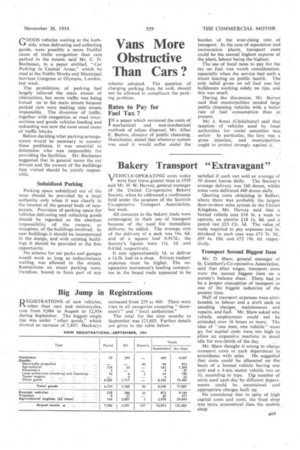Vans More Obstructive Than Cars ?
Page 53

If you've noticed an error in this article please click here to report it so we can fix it.
GOODS vehicles waiting at the kerbside, when delivering and collecting goods, were possibly a more fruitful cause of traffic congestion than cars parked in the streets, said Mr. C. D. Buchanan, in a paper entitled, "Car Parking in Central Areas," which he read at the Public Works and Municipal Services Congress at Olympia, London, last week.
The prohibition of parking had largely relieved the main streets of obstruction, but more traffic was being forced on to the main streets because parked cars were making side streets impassable. The diversion of traffic. together with congestion at road intersections and goods vehicles loading and unloading was now the most usual cause .of traffic blocks.
Before deciding what parking arrangements would be necessary to counter these problems, it was essential to determine who was responsible for providing the facilities. Mr. Buchanan suggested that in general terms the car drivers and the owners of the buildings they visited should be jointly responsible.
Subsidized Parking
Parking space subsidized out of the rates should be provided by a local authority only when it was clearly in the interest of the general body of ratepayers. Provision of parking space for vehicles delivering and collecting goods should be regarded as the absolute responsibility of the owners, or occupiers, of the buildings involved. In new buildings it should be incorporated in the design, and with existing buildings it should be provided at the first Opportunity.
No scheme for car parks and garages would work so long as indiscriminate waiting was allowed in the streets. Restrictions on street parking were, therefore, bound to form part of any scheme adopted. The question of charging parking fees, he said, should not be allowed to complicate the parking problem.
Rates to Pay for Fuel Tax ?
f N a paper which reviewed the costs of I mechanical and non-mechanical methods of refuse disposal, Mr. Allan E. Barton, director of public cleansing, Manchester, stated that whatever system was used it would suffer under the burden of the ever-rising cost of transport. In the case of separation and incineration plants, transport costs could be the second highest expense of the plant, labour being the highest.
The use of local rates to pay for the . tax on fuel was worth consideration, especially when the service had such a direct bearing on public health. The only relief given on oil fuel was for bulldozers working Solely on tips, and this was small.
During the discussion, Mr. Barton said that municipalities needed large public cleansing vehicles with a better rate of fuel consumption than at present.
Mr. J. Ames (Chislehurst) said that taxation of vehicles used by local authorities for social amenities was unfair. In particular, the levy was a gross injustice, and municipalities ought to protest strongly against it..




























































































